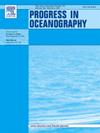夏季宇航员海和合作海颗粒有机物的稳定碳同位素组成
IF 3.8
3区 地球科学
Q1 OCEANOGRAPHY
引用次数: 0
摘要
本研究考察了2019年夏季南极洲宇航员海和合作海的颗粒有机碳(POC)及其同位素组成(δ13CPOC)。结果表明,夏季地表水中 POC 浓度的空间变化与 δ13CPOC 的空间变化基本一致,与合作海相比,宇航员海的 POC 和 δ13CPOC 值更高。两个海域的 δ13CPOC 值都与较小颗粒(< 20 μm)中 Chl-a 的比例呈正相关。然而,两个海域与较小颗粒(20 μm)中生物源 POC 比例的关系却不同。这种差异归因于浮游植物主要种类的不同。在宇宙人海,较小的浮游植物(纳米级和皮米级浮游植物)主要是 Phaeocystis antarctica,而在合作海,这些浮游植物主要是盾形硅藻。这两个海域深海水域的 δ13CPOC 随深度增加而增加,反映了有机再矿化的影响。利用雷利模型估算的再矿化过程中的碳同位素分馏系数在宇宙人海和合作海分别为 1.5 ± 0.2‰和 1.6 ± 0.2‰。这些微小的同位素效应表明,从上层输出的有机物同位素信号在深海中保存完好。此外,在合作海达恩利角多旋回区外的底层海水中观测到异常高的δ13CPOC值,反映了在AABW形成过程中来自陆架的冰藻有机物的输入。简单的同位素质量平衡估算表明,合作海AABW中6-19%的POC来自冰藻。我们的研究凸显了影响南大洋δ13CPOC因素的复杂性,强调了浮游植物群落组成的重要性。本文章由计算机程序翻译,如有差异,请以英文原文为准。
Stable carbon isotopic composition of particulate organic matter in the Cosmonaut and Cooperation Seas in summer
This study examined particulate organic carbon (POC) and its isotopic composition (δ13CPOC) in the Cosmonaut and Cooperation Seas in the Antarctica during the summer of 2019. Our results show that the spatial variation of POC concentration in summer surface water generally mirrors that of δ13CPOC, with higher POC and δ13CPOC values in the Cosmonaut Sea compared to the Cooperation Sea. The δ13CPOC values in both seas were positively correlated with the proportion of Chl-a in smaller particles (< 20 μm). However, the relationship with the proportion of biogenic POC in smaller particles (< 20 μm) differed between the two seas. This discrepancy is attributed to differences in the dominant phytoplankton species. In the Cosmonaut Sea, smaller phytoplankton (nano- and pico-phytoplankton) were dominated by Phaeocystis antarctica, whereas in the Cooperation Sea, they were dominated by pennate diatoms. The δ13CPOC in deep waters of both seas increased with depth, reflecting the effects of organic remineralization. The carbon isotope fractionation factors during remineralization, estimated using Rayleigh model, were 1.5 ± 0.2‰ and 1.6 ± 0.2‰ in the Cosmonaut Sea and the Cooperation Sea, respectively. These small isotope effects indicate that the isotope signals of organic matter exported from the upper layer are well preserved in the deep ocean. Additionally, anomalously high δ13CPOC values were observed in the bottom water outside the Cape Darnley polynya in the Cooperation Sea, reflecting the input of ice algae-derived organic matter from the shelf during AABW formation. A simple isotopic mass balance estimate suggests that 6–19% of the POC in the AABW of the Cooperation Sea is contributed by ice algae. Our study highlights the complexity of factors affecting δ13CPOC in the Southern Ocean, emphasizing the importance of phytoplankton community composition.
求助全文
通过发布文献求助,成功后即可免费获取论文全文。
去求助
来源期刊

Progress in Oceanography
地学-海洋学
CiteScore
7.20
自引率
4.90%
发文量
138
审稿时长
3 months
期刊介绍:
Progress in Oceanography publishes the longer, more comprehensive papers that most oceanographers feel are necessary, on occasion, to do justice to their work. Contributions are generally either a review of an aspect of oceanography or a treatise on an expanding oceanographic subject. The articles cover the entire spectrum of disciplines within the science of oceanography. Occasionally volumes are devoted to collections of papers and conference proceedings of exceptional interest. Essential reading for all oceanographers.
 求助内容:
求助内容: 应助结果提醒方式:
应助结果提醒方式:


